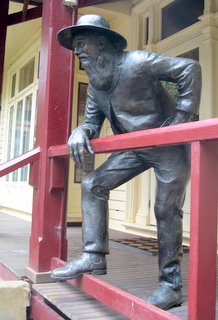
"The Man From Ironbark" is a poem by Australian bush poet Banjo Paterson. It is written in the iambic heptameter.
"Freedom on the Wallaby", Henry Lawson's well known poem, was written as a comment on the 1891 Australian shearers' strike and published by William Lane in The Worker in Brisbane, 16 May 1891.
"Saint Peter" is a well-known poem by iconic Australian writer and poet Henry Lawson. It was first published on 8 April 1893 in The Bulletin.
The City Bushman is a poem by iconic Australian writer and poet Henry Lawson. It was first published in The Bulletin magazine on 6 August 1892, under the title In Answer to "Banjo", and Otherwise. It was the fourth work in the Bulletin Debate, a series of poems by both Lawson and Andrew Barton "Banjo" Paterson, and others, about the true nature of life in the Australian bush.
Banjo, of the Overflow is a poem by Australian poet Francis Kenna. It was first published in The Bulletin magazine on 27 August 1892 in reply to fellow poets Henry Lawson, Banjo Paterson and Edward Dyson. This poem formed part of the Bulletin Debate, a series of works by Lawson, Paterson, and others, about the true nature of life in the Australian bush.
"Bell-Birds" is a poem by Australian writer Henry Kendall that was first published in The Sydney Morning Herald on 25 November 1867.
In Answer to Various Bards is a poem by Australian writer and poet Andrew Barton "Banjo" Paterson. It was first published in The Bulletin magazine on 1 October 1892 in reply to fellow poet Henry Lawson's poem, In Answer to "Banjo", and Otherwise.
The Poets of the Tomb is a poem by Australian writer and poet Henry Lawson. It was first published in The Bulletin magazine on 8 October 1892 in reply to fellow poet Andrew Barton "Banjo" Paterson's poem, In Answer to Various Bards.
Saltbush Bill is a humorous poem by Australian writer and poet Andrew Barton "Banjo" Paterson. It was first published in The Bulletin magazine on 15 December 1894, the Christmas issue of that publication.
"Where the Dead Men Lie" is a poem by Australian poet Barcroft Boake. It was first published in The Bulletin magazine on 19 December 1891, and later in the poet's poetry collection Where the Dead Men Lie, and Other Poems (1897).

The Teams is a poem by Australian writer and poet Henry Lawson. It was first published in the Australian Town and Country Journal on 21 December 1889. It was later published in the poet's poetry collection In the Days When the World Was Wide and Other Verses in 1896.
Where the Pelican Builds is a poem by Australian poet Mary Hannay Foott. It was first published in The Bulletin magazine on 12 March 1881, and later in the poet's collection Where the Pelican Builds and Other Poems (1885).
The Wind at Your Door (1959) is a one-poem volume by Australian poet R. D. Fitzgerald. The poem was originally published in The Bulletin on 17 December 1958, and later in this 275 copy Talkarra Press limited edition, signed by the author. It won the Grace Leven Prize for Poetry in 1959.
"Crime in the Bush" (1899) is a dramatic essay by the Australian writer Henry Lawson.
"Faces in the Street" (1888) is a poem by Australian poet Henry Lawson.
"The Song of Old Joe Swallow" (1890) is a poem by Australian poet Henry Lawson.
"The Crane is My Neighbour" (1938) is a poem by Australian poet John Shaw Neilson.
"The Fire at Ross's Farm" (1890) is a poem by Australian poet Henry Lawson.
"A Bushman's Song" (1892) is a poem by Australian poet A. B. Paterson.
"The Roaring Days" (1889) is a poem by Australian poet Henry Lawson.

